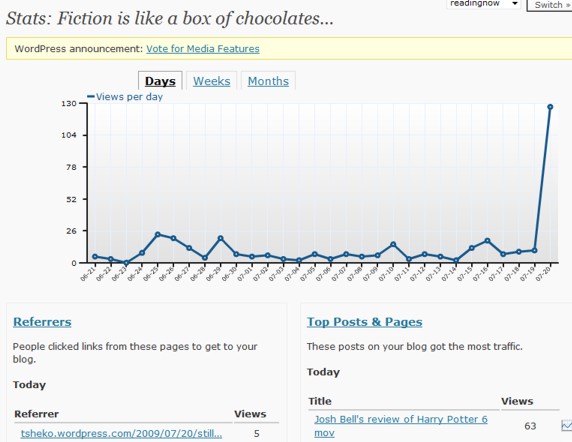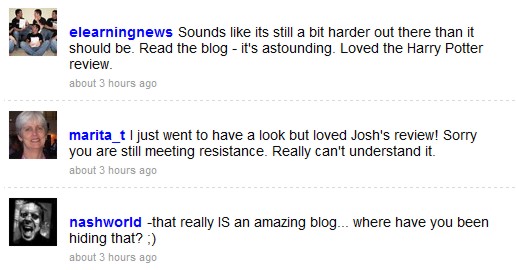Recently I’ve moved my school library book review blog from an internal one within the school intranet (Sharepoint) to an external WordPress one. Just today I received an email from our Computer Systems Manager:
Do you realise that by using the WordPress site, you are denying most of our students easy access to your work. Sure, a few students might check it out in the Library at lunchtime but by the time most students get home, other priorities will have come to the fore. So, why not place your blog in the public section of the College Intranet? There you will get the best of both worlds, public access and, immediate and unhindered student access.
I should explain that we are a laptop school, but that internet access has to be booked by teachers, and is otherwise accessible to students before school, at recess and at lunchtime.
It was difficult to answer this email without writing a thesis! This is the best I could do:
In answering your email, I started thinking about the meaning of ‘Sharepoint’ – a place where the school shares resources, information, etc. Sharepoint’s centralised, sharing facility is a powerful way to synchronise and share resources and activity in the school. Yes, I did realise that by transferring my fiction blog to WordPress, students wouldn’t be able to access it during class times. I made the decision to move after using Sharepoint for almost a year, and I didn’t make that decision lightly, but based on important considerations.
Funnily enough, the sharing within Sharepoint was limiting what I wanted to achieve with the blog. Sharepoint is an excellent school-based resource, but it didn’t meet our needs entirely. Firstly, there were restrictions, such as the fact that I couldn’t link to specific posts, so that when I posted more than one post, I couldn’t link to a specific one which had been pushed down by others. I also couldn’t embed videos. Book and film trailers are popular with students, and often lead them to reading and discussing books.
Access during classtimes did not increase readership, and I can only estimate this through anecdotal evidence with the Sharepoint blog, because, unlike WordPress, it doesn’t provide me with valuable data on readership. As you say, students can only access the blog during lunchtime and recess, but they wouldn’t be able to read it in class anyway, unless given permission by the teacher, or when the teacher specifically books the internet. Since the move to WordPress, I’ve actually had an increasing number of emails from staff who prefer the appearance and options within WordPress, and following from their interest, I’ve been booked into classes to introduce the blog and talk about books. The blog is not generally something students are reading, unless I set a challenge or competition, but teachers who realise its potential are beginning to use it as an interactive medium for students.
Author visits are expensive, and so I find that embedding videos of author interviews allows students to ‘get to know’ authors as real people, people they can relate to. When I show students the blog and give them time to browse, they inevitably veer towards the videos – not surprising considering their preference for media. We do what works in encouraging students to appreciate books and authors, and we must do what works best in engaging students in learning. When students use Web 2.0 technologies, they are also learning netiquette – an important skill considering the dominance of technology in their future lives of work.
The sharing aspect is the most important feature of external blogs . Just as teacher librarians and librarians encourage students to join local and larger libraries, so do we strive to share our reviews and comments with students and teachers in other schools, even in other countries. Every comment received is emailed to me for moderation before it is published. I write the fiction blog for the whole school community, and I hope to extend our community to include other schools. We benefit from this interaction, and it enriches our discussion. Currently I’m compiling a list of excellent reading blogs of interest to both staff and students, which will be added to the blog as widgets.
The work we do with Web 2.0 technologies at Whitefriars can be shared with others, and I find this enriching. I share, and I receive tenfold if not more. The School Library Association of Victoria blog, Bright Ideas, features what schools in Victoria are doing online, and our school has a positive profile throughout the state already, through its educational projects in wikis, blogs and nings.
There are many more reasons for our choice to go with the WordPress blog, but it’s important to note that it is based on our commitment to Web 2.0 technologies rooted in the latest pedagogy. We are not ignoring Sharepoint, we are just selecting the best application for our needs. As with any technology, it must be rooted in best pedagogical practice. Choice of online space should also be dictated by student learning within the context of the school’s mission statement. If we educate our young men ‘to take their place in society as valued individuals’, then learning should take place not only in the classroom, but within the context of broader society. This, then, is the most appropriate context for blogs.
I apologize for the wordy reply, but I thought it was important to give you a detailed answer. In conclusion, let me suggest you look at the Global Teacher website where you will find lists of school library blogs (under ‘Bookrooms’), school blogs and teacher blogs.
I appreciate the opportunity to define my reasons for external blogs in education, and also to receive excellent advice from my professional network. Just as you would ask friends for advice, so I ask my Twitter network for opinions and ideas. In a short space of time, seven people offered support for the use of external blogs. One even provided me with a link to the exact webpage where I could find my school’s mission statement! (Thanks, Marita)
Here are some of the points raised in Twitter supporting Web 2.0 applications:
- a global audience is important
- so students can have input from a wider audience – authors, scientists, explorers – who knows who else can assist their learning
- develop netiquette
- students can see their work published.
- Can share work with parents, grandparents.
- Can make networks.
- Show people they can use ICT.
- schools should have policies that have been thoughtfully crafted by all stakeholders
- online policies should be consistent with the Vision and Mission Statements of the school
I’m really interested in hearing your views on this subject. How would you answer this email? What approach would you take? I’m wondering if my answer is too heavy-handed. What do you think?





